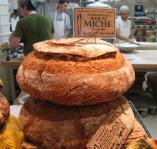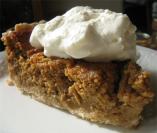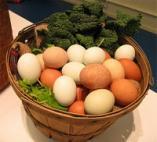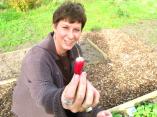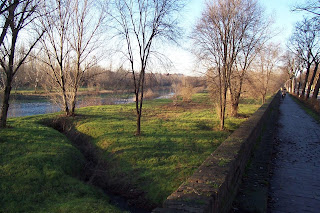
We had a beautiful weekend in Parma: a cool and clear Sunday, ideal for a stroll by the river, after a sprinkling of snow on Friday. That was a meteorological Australia Day gift for our Ozzie colleague, who’d graced us that afternoon with bone fide Vegemite sandwiches, Mintos and Fantales. Friday night several of us checked out Shri Ganesh,the Indian restaurant in town, and it was good: wonderful tandoori chicken, dhal and samosas, and lots of other things too.
Meli has passed along a timely story from BBC News about milk prices and farmer underpayment: A woman sat in a bath of cold milk outside Parliament in protest at the price per litre dairy farmers are paid. (And if you want to support dairy farmers in a real way, you might like to pick one off your morning pint, if you’re lucky enough to get the ones with the lonely hearts ads on them.)
Meanwhile, more classes since the great pig farm visit of ’07. Since Wednesday, we’ve had some wine history, wine technology, sensory analysis, more olive oil tasting, and a dash of semiotics. Phew. Here are some highlights.
Wine history: I was delighted to hear Allen Grieco speak in support of Retsina, the Greek wine that was born from an ancient quest for preservatives – and one turned out to be pine resin, which led to a characteristic aroma and flavour, which nurtured a taste, which only began to die when foreign tourists started to swamp the tastes and production values in Greece within the last thirty years.
In my experience you are either born a retsina drinker or not. Our family was divided on that point. I’d like to suggest maybe it’s a genetic thing, like tongue-rolling? Anyway it made me look forward to visiting Crete again, as I remember well the delightful bottles of retsina made in Chania that perished on my last visit.
Sensory analysis… more statistics. Horrible stuff. And discretion forbids me from saying anything more about the nature of the class; indeed, the very need for discretion says all that should possibly be said about that.
And I would have thought that all that kind of complex thinking about communication in the form of signs (present through their absence) should have made me ready for yesterday’s start in semiotics. But not.
I prefer the oil and wine studies.
Oil tasting was, as always, delightful in every way. We had Greek olive oil day yesterday. The mystery factor was a second tasting of one of the oils after it had been heated to below the smoking point (which no doubt everyone but me always knew was 180 degrees c, right?). So even though it was just heated and cooled, with nothing cooked in it, the flavour was totally gone. It had none of the aroma of the original wine, and smelled and tasted a bit like popcorn. A helpful reminder about (a) keeping your olive oil cool, dark and away from exposure to oxygen; and (b) don’t cook with the good stuff! It’s meant to be added as a condiment after the cooking’s finished. Heat will bring out its flavours, but cooking it will only kill them. A fine line.
You can make it into mayonnaise, if it’s not too bitter or peppery: very pretty. (Guess which one was made – not from olive oil – by Kraft?)
Another useful tip for those of us maybe schlepping wondrous bottles of extra virgin olive oil thither and yon, fresh from some exquisite pressing in far-flung places: you can freeze it if you need to. But once you thaw it, use it up faster than you would fresh, as it will be that much more fragile. As we never tire of hearing, olive oil does not improve with age: its power, aroma and flavours dissipate as time goes by.



